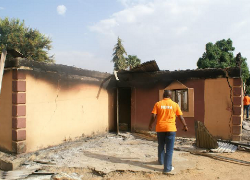On Monday, April 7, the University of Denver Sturm College of Law will welcome Nigerian human rights attorney Hauwa Ibrahim. Ibrahim has spent her career protecting woman from the harsh penalties meted out under Shariah law in Nigeria’s northern states such as death by stoning and amputations for stealing. Another area of grave concern in Nigeria is the lack of religious freedom, primarily due to attacks by the Boko Haram, a fundamentalist terrorist group that seeks to overthrow the secular Nigerian government and replace it with a theocracy based on Islamic law.
Nigeria is the largest country in Africa with a population of over 177 million people. The country is divided approximately equally between Muslims and Christians. Islam is the dominant religion in the northern states, including the twelve northern states that have adopted Sharia law, while Christianity is most prevalent in the southern states. Interreligious conflicts occur frequently along Nigeria’s central states, or the “Middle Belt” where Christians and Muslims live in approximately equal numbers.

On Friday, March 14, the tragic trend of sectarian violence continued in three villages in the central northern state of Kaduna. At about 11 pm, Muslim Fulani herdsmen raided the mainly Christian villages with guns and machetes. The Fulani are one of Nigeria’s 250 ethnic groups, are predominately Muslim, and have a history of land grievances against Nigerian Christians. The herdsmen descended on the villages and burned 240 houses and three churches to the ground. More than 150 people were killed and the victims were buried in mass graves.
One survivor, Emmanuel Tonak, recounted the attack: “We were fast asleep when we heard gun shots and chanting of ‘Allahu akbar’ [God is great]. Suddenly we came out and saw them advancing and some houses in flames. They came around 11 pm. I escaped into the forest, when they came I started hearing cries and gun shots.” Because the villagers’ homes were destroyed, many other survivors slept in the local primary school and other areas nearby. Sadly, the attack in Kaduna is unlikely to be the last. Since 1999, religiously motivated violence has killed more than 14,000 Nigerians, both Christian and Muslim, displaced thousands, and destroyed churches, mosques, businesses, and private homes.
The United States Commission on International Religious Freedom (USCIRF), an independent bipartisan commission that monitors global religious liberty and makes policy recommendations to the President, Secretary of State, and Congress, has recommended that Nigeria be labeled a “Country of Particular Concern” for the past four years for its systematic, ongoing, and egregious violations of religious freedom. As USCIRF explains, the United States can play a role in mitigating the sectarian violence in Nigeria including by prioritizing religious freedom in U.S.-Nigerian bilateral relations (which is significant as Nigeria is the eigth largest U.S. aid recipient) and officially designating Nigeria as a Country of Particular Concern under Section 402(b)(1) of the International Religious Freedom Act.
Bryan Neihart is a third year law student at the University of Denver Sturm College of Law and the Survey Editor of the Denver Journal of International Law and Policy.

